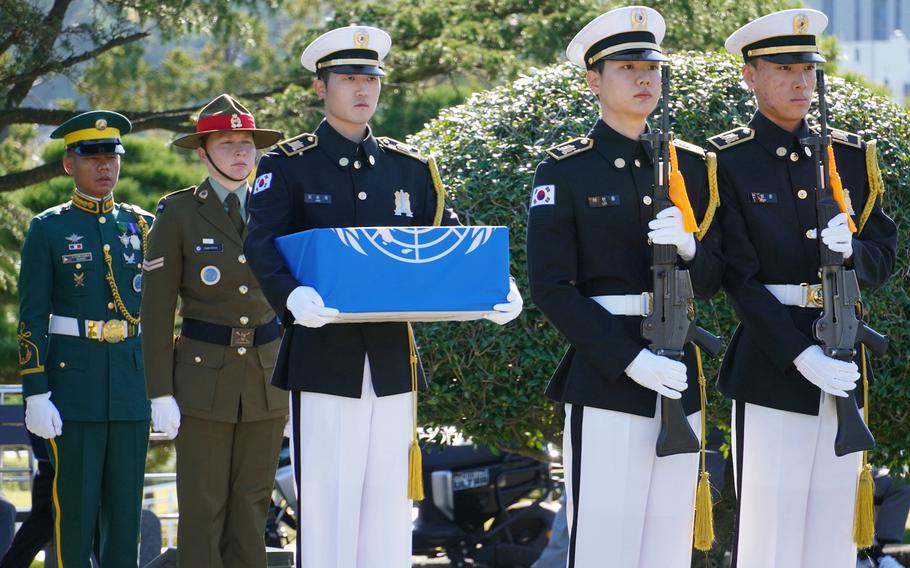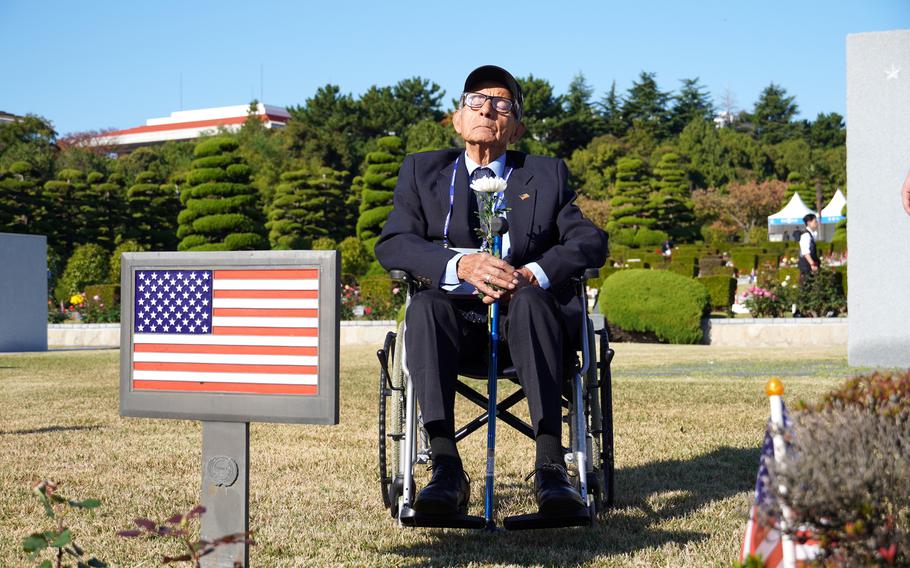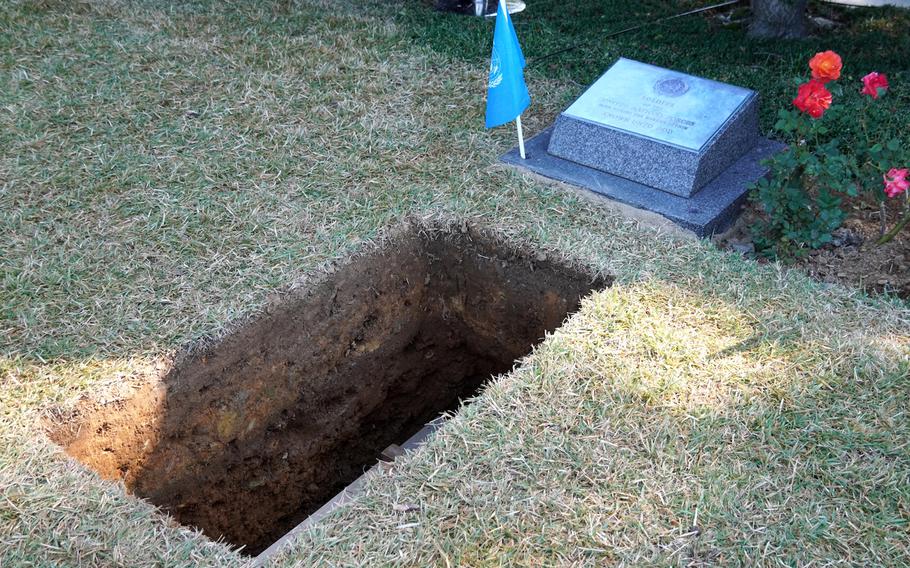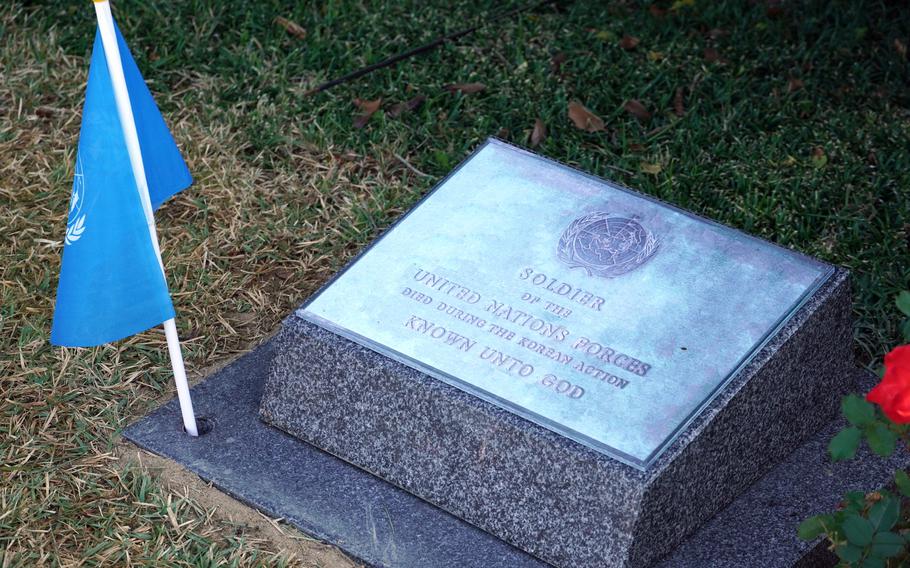
The U.N. Command Honor Guard carries the remains of an unidentified Korean War service member at the U.N. cemetery in Busan, South Korea, Nov. 11, 2024. (David Choi/Stars and Stripes)
BUSAN, South Korea — Military veterans and troops from more than 20 countries gathered here Monday to pay their respects as an unknown Korean War service member was laid to rest at the U.N. Cemetery in Korea.
Roughly 1,000 people attended the service on International Memorial Day for U.N. Korea War Veterans, observed each year on Nov. 11. It was hosted by the U.N. Command and South Korea’s Ministry of Patriots and Veterans Affairs, or MPVA, at the only cemetery overseen by the command.
The burial ground, roughly 200 miles southeast of Seoul, holds the remains of 2,329 veterans from 14 member states who participated in the 1950-53 Korean War. They include 40 service members from the United States; 892 from the United Kingdom; 38 from South Korea; 462 from Turkey; and 281 from Australia.
Monday’s service honoring war veterans included the cemetery’s first interment of an unidentified U.N. Command service member. The remains were initially recovered from Yeoncheon county in 2010 by South Korea’s Ministry of National Defense Agency for Killed in Action Recovery Identification.

Aurelio Aguilar Ruiz, 94, visits a U.S. service member's gravesite at the U.N. cemetery in Busan, South Korea, Nov. 11, 2024. Ruiz said he served as a 1st Infantry Division rifleman during the Korean War. (David Choi/Stars and Stripes)
The burial illustrates “the promise of [South Korea] … to take full responsibility for each and every U.N. veteran who died fighting,” MPVA minister Kang Jung-ai told those gathered for the ceremony.
“South Korea will never forget the seeds of freedom that young heroes have sown with their lives,” she said.
DNA testing and dental records determined the 17- to-25-year-old service member was of Caucasian descent and likely to have been from Britain, according to the MPVA.
Unable to confirm the identity or nationality with certainty, the South Korean government allowed the service member to be buried in a new plot dedicated to unidentified remains.
Of those buried in the cemetery, 78 chose to be interred there, including retired Thai army Command Sgt. Maj. Rod Asanapan, 100, who became the first soldier from his country to be laid to rest at the cemetery on Monday.

The U.N. Command prepares to bury an unknown Korean War service member during a Veterans Day ceremony at the U.N. cemetery in Busan, South Korea, Nov. 11, 2024. (David Choi/Stars and Stripes)
Asanapan, then a corporal, volunteered to deploy to Korea with a medical detachment in 1952. Thailand contributed around 6,000 troops during the onset of the war, before it officially established diplomatic relations with the South, according to the Ministry of Patriots and Veterans Affairs.
Korean War veteran Aurelio Aguilar Ruiz, 94, of Visalia, Calif., attended Monday’s ceremony on his first trip to the peninsula since his two-year tour ended in 1952, he told Stars and Stripes at the cemetery. Ruiz said he served as rifleman for the U.S. Army’s 1st Infantry Division and recalled the weather being “so ungodly cold” he got frostbite on his fingers.
Ruiz said he resisted visiting South Korea for decades, but his wife convinced him to come this year.
“Since I saw it destroyed completely from one end to the other, I didn’t want to see Korea anymore,” he said.

The U.N. Command prepares to bury an unknown Korean War service member during a Veterans Day ceremony at the U.N. cemetery in Busan, South Korea, Nov. 11, 2024. (David Choi/Stars and Stripes)
The Korean War began June 25, 1950, when North Korean forces invaded the South to unite the peninsula under communist rule. North Korean troops captured Seoul three days after the invasion, prompting the U.N. Security Council to establish the U.N. Command to thwart the advance.
The U.S.-led command was composed of 22 member states. Most, including the U.S. and United Kingdom, provided combat troops. Others sent medical aid and physicians.
As the war evolved into a stalemate, an armistice was signed by the U.N Command, North Korea and China to end hostiles on July 27, 1953. Eighteen nations are now part of the command, which continues to enforce the armistice.
Around 37,000 U.S. and 415,000 South Korean troops were killed in the war, according to the Defense Department news release July 24, 2023.